
“Visas and Virtue” won the Oscar for Best Short Film at this year’s Academy Awards. A Japanese “Schindler’s List,” it is the true story of Japanese Consul General Chiune “Sempo” Sugihara, who was stationed in Lithuania in 1940. When he found his consulate besieged by Jewish refugees in need of visas to escape the Nazi horror, he wrote some 2,000 visas without stop, right up until the moment his train pulled away from the station, when he was ordered to leave his post.
Transcript
AMY GOODMAN: You’re listening to Pacifica Radio’s Democracy Now! I’m Amy Goodman.
Well, at this point, you’ve probably all heard of Schindler’s List. But have you heard of Sugihara’s list? Today you’re going to learn the story about a man named Chiune Sugihara, one of the most important rescuers of Jews during World War II. Because of the bravery of this Japanese diplomat, an estimated 40,000 descendants of refugees he saved are alive today.
In the fall of 1939, Chiune Sugihara was sent by the Japanese government to Kaunas, also known as Kovno, Lithuania, to open a consulate. When Nazi armies invaded Poland, a wave of Jewish refugees fled eastward into neighboring Lithuania, bringing with them chilling tales of German atrocities. Thousands of Polish Jews converged on the Japanese Consulate, begging Mr. Sugihara for transit visas to escape Poland through the Soviet Union to Japan. Sugihara wired his government in Tokyo three times for permission to grant these visas. He was denied every time. The consul, Chiune Sugihara, consulted with his family and decided that they would help save the Jewish refugees.
This weekend, I had a chance here in New York City to go up to White Plains, just out of New York, to a synagogue called Kol Ami, where they were honoring the memory of Chiune Sugihara, and they were doing it by listening to his son, Hiroki Sugihara, who is dedicating his life to the memory of his father’s name. The rabbi of the congregation Kol Ami is Rabbi Shira Milgrom. And this is why she said it was important to remember a man like Mr. Sugihara.
RABBI SHIRA MILGROM: Some 20 years ago, David and I were present in a congregation in Southern California, thousands of people on the High Holidays, when Rabbi Harold Schulweis called out to the congregation, and he asked all of us sitting there to name the members of Hitler’s SS, Hitler’s top leadership, and one by one people stood up all over the congregation to call out the names of people we know well, the names of Eichmann and Goebbels and on and on. And then he said, “Name for me the people who saved the family of Anne Frank.” And 3,000 people sat in silence. And he said, “Isn’t it amazing that we have an expression in Hebrew, yimakh shemo? We say, 'Haman, yimakh shemo,' 'May his name be blotted out.' 'Hitler, yimakh shemo,' 'May his name be blotted out.' And whose names have we remembered? And whose names have we blotted out?” That for some reason, it’s much more difficult for us to remember and to preserve the names of those who risked their lives, of those who, as Lilly said, knew what it was to be a good human being. And I hope that we walk out of here not only being able to remember the name Sugihara, but also to know that we are able to achieve, as well, the extraordinary model which he set for us.
AMY GOODMAN: And that was Rabbi Shira Milgrom of the Kol Ami congregation in White Plains, New York, last Saturday morning as she talked about Mr. Chiune Sugihara. And joining us right now is his son, Hiroki Sugihara, to tell us the story of the Japanese consul, however many years ago. It was actually 58 years ago, when Hiroki here was only 5 years old.
Welcome to Democracy Now!
HIROKI SUGIHARA: Hi. Good morning.
AMY GOODMAN: Well, it’s great to have you here. We took a while in tracking you down, finally to the Bay Area, where you spend some of your time when you’re not living in Tokyo. And fortunately for us, you were coming to New York. So it is a pleasure to have you here today. Tell us about your father, Chiune Sugihara. We know about Oskar Schindler, a man who made a list of, I think it was, 1,200 Jews who worked in his factory, who he managed to save from the Holocaust. Your father signed visas for how many Jews?
HIROKI SUGIHARA: Well, we don’t know the exact numbers, but we we have his official list, but he was writing, and he sent it after he issued visa. We have a number of 2,139 names. But he said that he was writing more than that, because most of the time he only had to sign, and he could not take the names, because he had to issue as many as he can issue, because in that limited time of about 28 days he was issuing over 3,000. So, he had to write approximately between 200 and 300 visas a day. And as you know, these Japanese visas, you have to handwrite, because it’s not like typewriting in ABC.
AMY GOODMAN: So, tell us what those days were like in July of 1940 and how you came to a family decision. I mean, you were only 5.
HIROKI SUGIHARA: Yes.
AMY GOODMAN: But your father consulted you, as well, and your mother. How it is you came to a decision to defy your government, the Japanese government, because this was not the Japanese government that was saying, “We’ll save the Jews.” In fact, your father ended up being fired, having to resign when he went back to Japan.
HIROKI SUGIHARA: Well, this is the way it started, in July. I think it started around 24th, 25th of July, 1940. A group of Jewish refugees from Poland came to our consulate one day early in the morning. And first, he didn’t know who they were. Later, he talked to — he told the group to choose five delegates to come into consulate to explain him what they want. Eventually, he found out that those refugees came from Poland to Vilnius, which is about 90 miles from Kaunas. And then they traveled to Kaunas. Kaunas at that time was the capital of Lithuania. And they were the refugees, Jewish refugees from Poland. They requested transit visa going to Japan, because they didn’t have any other escape route in Europe. So they requested for a visa going to Japan through Russia. As you know, this is the most crucial time in the history in Eastern Europe, that Japan was just about to go to complete their Tripartite Pact between Germany, also Italy.
AMY GOODMAN: So, with Mussolini, Hitler —
HIROKI SUGIHARA: Yes.
AMY GOODMAN: — and Japan.
HIROKI SUGIHARA: Yes.
AMY GOODMAN: A tripartite alliance.
HIROKI SUGIHARA: So, apparently, he could not go against his government’s policy. He knew that. But, well, anyway, he requested permission from the main office, the foreign minister in Tokyo, so he can issue many, many visas.
AMY GOODMAN: It’s interesting how it worked, that they needed a point, a transit point, to go through Japan to get out of Eastern Europe. They needed a visa then, before that, to go through Russia, which they could only get if they had that Japanese visa to say they were headed somewhere. And then the Dutch Consul in the same city, in Kaunas, was giving visas to go to an endpoint, Curaçao — not that they would ever end up there, but just that they would have something on paper to say, to let — to tell the Japanese government that the Jews would not be staying in Japan. And that was the number of visas that they needed, through Russia, into Japan, but not remaining in Japan, and then somewhere else. And the Dutch said, “OK, you can go to Curaçao,” although the people didn’t end up going there.
HIROKI SUGIHARA: Right. There was some kind of a complication, because the refugees wanted to go through Japan, but the — Japan could not let them stay safe for long. As a result, my father has to negotiate with Russian consul general first, because they will be going through Siberia first, and then they will go through Japan. And from Japan, they have to have end visa, because the visa which he was issuing was the transit visa, and it’s only good for 10 or 15 days.
AMY GOODMAN: I wanted to hear now from Lilly Singer. She’s a woman who was saved by your father, Chiune Sugihara. Her father went to the Japanese Consulate in Kaunas, Lithuania. And I met her this Saturday. She was one of a few survivors who had gathered, who had been saved by Sugihara. And this is how she described that day.
AMY GOODMAN: Do you remember the day your parents got the visa from Mr. Sugihara?
LILLY SINGER: 27th of July.
AMY GOODMAN: What did they do that day?
LILLY SINGER: Nothing much. My father and my brothers all came back from Kovno to Vilna. And we were just very happy that we finally have — well, it’s like a door opened. That’s exactly what it was like: A door opened.
AMY GOODMAN: Did they describe to you what going to Mr. Sugihara’s office was like that day?
LILLY SINGER: What it was, first of all, the predominant memory I have is this waiting, the hundreds and hundreds and hundreds of people waiting in lines, leaning on the gates of the consulate. The consulate garden was encompassed in a sort of a wall with wrought iron balustrades with it, and these thousands of people just standing there. These were lawyers, doctors, judges, famous, intelligent people. And when you look at the picture — and it’s available — of these people, they look — like the proverbial Wandering Jew, disheveled and poor and wrinkled and tired. I mean, it’s amazing. These same people, who a couple of months before were living in luxury and doing very good work and intelligent people, just looked so downtrodden.
AMY GOODMAN: And these were refugees from German-occupied Russia and Poland.
LILLY SINGER: Also from Russian-occupied Poland. The lady who spoke before came from Russian-occupied Poland, I think. Anyway, it was very hard, because it was — the Russians did not want to let anybody out. But if you came from a territory that they were not occupying, they had a right to send you to Siberia to work camps. So that was our choice: stick around ’til they send you to war camp, go back into German-occupied territory and be under the Nazis, or try to get out somehow.
AMY GOODMAN: Did you know at that time that the Germans were killing Jews?
LILLY SINGER: We knew what had happened in 1939, ’38, and with the Anschluss of Austria and Czechoslovakia. And we knew how they humiliated Jews in Germany, making them — you know, cutting off their beards, making them dance, scrubbing floors. You know, Kristallnacht, after all, happened long before that.
AMY GOODMAN: The breaking of the glass of Jewish shopkeepers.
LILLY SINGER: Right. So we knew we were in danger. Did we know about extermination camps? No. I don’t think that was within the realm of possibility in any normal person’s brain.
AMY GOODMAN: And that was Lilly Singer, one of the Sugihara survivors, I think that is fair to say. She now sits on the Westchester Holocaust Commission in New York. You are listening to Democracy Now! on Pacifica Radio, as we talk to Hiroki Sugihara, the oldest son of Chiune Sugihara, the Japanese consul in Lithuania who defied his own government to save thousands of Jews. In fact, Lilly Singer was one of those who was an addition to her parents’ visa. While the visa said two, for her mother and father, she was a child, and they just added her to that visa, which is why we’ll never know the exact number of Jews that Mr. Sugihara saved. So, though, back to Hiroki, when you were 5 years old, and you looked out the window, and you saw all these people outside —
HIROKI SUGIHARA: Yes.
AMY GOODMAN: — what did you say to your father and mother?
HIROKI SUGIHARA: Well, first, I was very curious, because, as a kid, we could not understand what was happening. And also, we didn’t know who they are, why they came, and why such a big crowd came to our consulate, because usually we didn’t see so many people coming into our consulalte. So I started asking a lot of questions to my father. And he told me, as, you know, this small kid can understand — he explained me that these are the refugees who came from Poland. They are Jewish people. And also, I asked him, “Who are the kids?” They said, “They came with their parents.” Consequently, I understood that they needed to escape. This is very simple for me to understand, other than that they actually needed visa going through. So, I said, “Why don’t you help them?” And also, I asked him, “Why do we have to help them?” He said that they might be killed if he doesn’t help them. So, naturally, it was my instinct that I started asking him to help these children outside of the gate.
AMY GOODMAN: Because so many children were there with their parents?
HIROKI SUGIHARA: Yes.
AMY GOODMAN: But your father also knew that he was risking the life of his sons, his three sons, and his wife —
HIROKI SUGIHARA: Yes, yes.
AMY GOODMAN: — and himself, of course, by doing this.
HIROKI SUGIHARA: Yes. Before issuing visa, he asked my mother to take all the children and go back to Japan, because he thought that there will be some kind of danger once he start issuing the visa. But my mother refused. She said she will stay here and help him.
AMY GOODMAN: And so, for a month, he never stopped writing, never stopped signing these visas.
HIROKI SUGIHARA: Yes, he was writing between 200, 300 visas a day.
AMY GOODMAN: In a few minutes, we’ll hear from another woman. Her name is Lucille Camhi. And she went into the embassy to the consul herself, to the consulate, with her sister. She was 16, her sister 17. And they met your father and had tried and tried to get in. I think they were the last ones in before you all moved. After about a month, the consul was shut down.
HIROKI SUGIHARA: Yes.
AMY GOODMAN: Why?
HIROKI SUGIHARA: The Russian was going to take over Lithuania from German. And so they warned or they ordered all the consulates and embassies in Lithuania to evacuate from Lithuania in August.
AMY GOODMAN: Of 1940.
HIROKI SUGIHARA: 1940, yes. And the Japanese Consulate was the last one to evacuate, so we could not stay any longer than August, end of August.
AMY GOODMAN: And even where you went to, the hotel you went to —
HIROKI SUGIHARA: Yes.
AMY GOODMAN: — your father continued to write visas.
HIROKI SUGIHARA: Yes, we stayed two days to wait for the train going to Berlin, and he was issuing visas at the hotel and also at the station. Until the train was pulling out, he was passing out all the papers.
AMY GOODMAN: We’re talking to Hiroki Sugihara, the son of Chiune Sugihara, who saved thousands of Jews along with his wife, Yukiko Sugihara. And they’ve written a book, Visas for Life, written by Hiroki’s mother, Yukiko, and translated by him, about Chiune Sugihara. When we come back, we’ll find out what happened to him when he returned to Japan. You’re listening to Pacifica Radio’s Democracy Now! We’ll be back in a minute.
[break]
AMY GOODMAN: You’re listening to Pacific Radio’s Democracy Now! I’m Amy Goodman. My guest is Hiroki Sugihara, the son of Chiune Sugihara, who is, well, a man many are calling the Japanese Schindler, a man who, as Japanese diplomat in Kaunas, Lithuania, signed more than 2,000 transit visas for Jews to escape from Lithuania, go through Japan to other points, just to escape from the Nazis. I met him on Saturday, when he was at a synagogue in White Plains, New York. And I also got to meet some of the men and women his father and mother saved. Among them was Lucille Camhi, and she tells the story of her meeting with Mr. Sugihara.
LUCILLE CAMHI: There were no way to get out, because Europe was engulfed in war all over. There was no way out, except, a few months later, we heard a rumor that there was a Japanese diplomat in Kovno, Lithuania, giving out transit visas to Japan. And that was the only open way to get out anywhere, to go to Japan. But in order to go to Japan, you had to go through Russia. And so, we, my sister and I, acquired a permit to go from Vilna to Kovno. And we tried to get into the consulate to get this transit visa. When we got there early in the morning, there was a line way around the block. And we couldn’t get in that day. We went back to Vilna, because the permit that we got, you were only allowed to go there for the day. You could not stay overnight. So we had to go back to Vilna, and we tried two more times. And the third time, we were lucky enough to get in to Mr. Sugihara’s office.
AMY GOODMAN: Can you describe the office and what it was like to get in on your third try?
LUCILLE CAMHI: To get in, it was a tough one. You stood on line — we stood on line like from about 7 or 8 o’clock in the morning. We didn’t get in there 'til around 4, 4 o'clock in the afternoon. And the office was a little room. And there was a desk, a big desk — he was sitting behind it — and two small tables on each side. And there were two people sitting — two other gentlemen sitting at those tables. And when we came in, we were sort of running up the stairs, and we were breathless. He looked very sympathetic, too, was a very kind-looking man. And he asked us — he saw we were very young. He asked us where are our parents, and we told him that our father passed away, and our mother remained in Vilna, where — because she didn’t have any kind of traveling papers. And he looked at us with so much compassion and sympathy. And he just took our passport and stamped it. And my sister and I became hysterical and started to cry and thank him — “Thank you! Thank you!” — in Polish. He didn’t speak Polish. He spoke other languages. And he sort of raised his hand and said, “It’s OK.” Like, he didn’t say that — meaning, like, “It’s OK. Don’t worry.” And we went out of the room. And that was that. It was — he was the most kind-looking man. He was just so — you know, and we were so frightened.
AMY GOODMAN: Lucille Camhi, describing her experience going to the Japanese Consulate in Lithuania in the summer of 1940 with her other teenage sister, and it was there that they got the transit visa they needed to leave Lithuania, just ahead of the Nazis, and go to Japan and eventually head to the United States. Our guest, Hiroki Sugihara, the son of the Japanese consul, who now has an organization in this country called Visas for Life, which dedicates itself to perpetuating the name of Chiune Sugihara. Visas for Life is also the name of a book about the story of Mr. Sugihara. Now, what happened, Hiroki, when you went back, eventually, after the war? Well, you were actually in a detention camp in Romania for two years with your family.
HIROKI SUGIHARA: Yes. The war ended in Europe in 1945 in the spring. And then, at that time, we were in Romania. And naturally, Russia came into Romania when they invaded, and they captured us, because Japan lost the war also. So they took us to the camp, and we had to spend about 18 months in Romania in a Russian concentration camp. And then we headed back to Japan in 1947, which took us about four months going through the Siberia. This was in the wintertime. It was very cold. And then we arrived in Japan.
AMY GOODMAN: Not exactly to a hero’s welcome.
HIROKI SUGIHARA: No, no.
AMY GOODMAN: What happened to your father?
HIROKI SUGIHARA: Then he reported to his Foreign Ministry, because, you know, when you come back, you will have to go to the office. And then they told him to wait for a couple months until they will decide where he will be transferred, or, you know, have to wait for the next order. One day the letter came from them, and it said that “You have to resign.” He could not understand the reason, so he went to the office, and he asked the superior why they are requesting resignation. The superior told him that the reason — this is verbally, but he was told that the incident of Lithuania is the reason.
AMY GOODMAN: They called it “the incident of Lithuania.”
HIROKI SUGIHARA: Mm-hmm, right.
AMY GOODMAN: And that incident was saving thousands —
HIROKI SUGIHARA: Saving Jewish, means that he was going against the order of the main office in Tokyo, because he was denied the request. The request was denied.
AMY GOODMAN: Which is what makes this story so interesting, because now, in speaking with a number of survivors, they said at the time they thought it was Japanese policy, that they were just going to a Japanese outpost at the consulate and that Japan was helping to save Jews. They didn’t understand that your father was defying the Japanese government.
HIROKI SUGIHARA: No, they couldn’t understand the reason why. I couldn’t understand for a long time also. The reason was that the visa was written in Japanese, and he was signing his Japanese name in Japanese. It was not in English, of course. And so, the refugee could not understand his name. And they didn’t know why he was issuing. They thought the Japanese government gave him permission to issue, because they — a lot of — the majority of the refugees didn’t talk to him.
AMY GOODMAN: So, how was he so-called discovered? How did it become known that it was this man, Chiune Sugihara, who had done this?
HIROKI SUGIHARA: Well, after many, many years, 28 years, I think some of the refugees were looking for my father to find him and thank him. They could not find my father, because they requested many requests to the Foreign Office in Tokyo, but they said, “We don’t know where Sugihara is.” Apparently, they should know. But they kind of didn’t want to touch this subject, because this is a very sensitive political issue for the Japanese Foreign Ministry. And also, my father didn’t talk about this, so nobody knew about this. And it took them to find my father about 28 [years], in 1968. That was the first time he was discovered by one of the refugees in Tokyo.
AMY GOODMAN: A refugee who just happened to find him, went looking for him.
HIROKI SUGIHARA: Yes. There’s a very interesting story, that — this person’s name is Nishri. And he was a young teenager who received a visa and went back — after the war, he went back to Israel. And in Israel, he became a diplomat. And then, he came — he requested that he wanted to go to Japan to serve in Israel Embassy in Tokyo, for the reason that he wanted to find Sugihara. So this is the way he found my father.
AMY GOODMAN: Your father had gone to work in a women’s clothing store?
HIROKI SUGIHARA: Yes. This was after the war, in 1950s.
AMY GOODMAN: After he was forced to resign from the Foreign Ministry?
HIROKI SUGIHARA: Mm-hmm. Well, he didn’t have any choice, and he had to support the family. So, whatever small job he could take on, he was taking. And he was working for a while, until he started working for a Japanese trading company.
AMY GOODMAN: Now, he died in what year?
HIROKI SUGIHARA: 1986 at the age of 86.
AMY GOODMAN: And he had been discovered at that point?
HIROKI SUGIHARA: Yes. He received — of course, he was discovered before that. And fortunately, he received the award from Israel in 1985, one year before he died, which is called Righteous Among the Nations.
AMY GOODMAN: And to be considered Righteous Among the Nations, it meant that you were not carrying out the policy of your government, but you stood alone in helping to save the Jews of the Holocaust.
HIROKI SUGIHARA: Right.
AMY GOODMAN: Why didn’t he talk about it, all the years that you were growing up, that you were all in Japan?
HIROKI SUGIHARA: Well, he was a person that he will not go out and talk about this kind of thing. He said he just barely made — he just simply did this because he wanted to help these people. And it was not such a big thing that he had to go out and be proud of — of course, I think he was very proud of doing this, but usually the Japanese, they don’t go out and talk about this. There must be — another reason was because, until 1968, he did not know if those refugees survived or not. We didn’t have any information also that they survived or not.
AMY GOODMAN: Was there ever a reunion of the thousands of people he saved? It’s now estimated, with descendants, we’re talking about 40,000 to 50,000 Jews around the world.
HIROKI SUGIHARA: Well, my father visited Israel one time in 1969. And he had many — he met many, many survivors in Israel.
AMY GOODMAN: I was reading an article in the New York Post, which is headlined “Japanese Schindler to get his due.” And the last paragraph, it says, “After he died, July 1986, his wife accepted a posthumous apology from the Japanese government for the way he had been treated.” Is that true?
HIROKI SUGIHARA: No, this is — I think the Japanese media made a mistake, because the vice minister of Japan in Foreign Ministry came to our home, and also we visited him. And he explained the situation, and he wanted to know what was happening. And also, first, he could not understand what happened in those days, because this guy is — even he’s a vice minister, he’s a young, young guy. And so we explained him the situation, what happened, and he said, “It must have been very hard for the family,” and this and that. And so he was telling this kind of thing, so the media, when he interviewed this vice minister, they kind of took his comment like he was apologizing. But there is no official apology.
AMY GOODMAN: And so, when you hold events around this country, does the Japanese government support you?
HIROKI SUGIHARA: Well, what do you mean by supporting? Financially or —
AMY GOODMAN: No, I don’t mean financially.
HIROKI SUGIHARA: — mentally or —
AMY GOODMAN: But how do they — how do they deal with Chiune Sugihara’s name?
HIROKI SUGIHARA: Well, I actually cannot — well, it’s very difficult. Sometimes they will attend to my event, and they’ll come, and they will say, “This was a nice thing.” And I think the direction is going towards in a better way.
AMY GOODMAN: But there’s no formal recognition at this point or a formal apology for how the Japanese government has treated your family or for recognizing what he did?
HIROKI SUGIHARA: Well, as a government, I think it is very difficult for them, because, as officially, what — on the record, what they have is that he resigned from his post. So, actually, they cannot say that they fired him. So —
AMY GOODMAN: He was forced to resign.
HIROKI SUGIHARA: — consequently, they cannot apologize.
AMY GOODMAN: Well, I want to thank you very much for joining us. And if people want to find out the story of Chiune Sugihara, there are two books, at least, that are written. One is a book written by Yukiko Sugihara, Hiroki Sugihara’s mother and Chiune’s wife. It is called Visas for Life. And the other book is a book that Hiroki Sugihara, our guest wrote, and it’s called Puppe’s Story, and it’s the story of a 5-year-old child and his remembrance of his father’s remarkable rescue of thousands of Jewish refugees during the Holocaust. They’re not published by a well-known press, by Edu-Comm. Plus. And if people want to get a hold of these books, what is the phone number that they can call?
HIROKI SUGIHARA: It is in San Francisco, 415-776-6745.
AMY GOODMAN: That’s 415-776-6745. And there’s also a documentary film that is being made of Chiune Sugihara’s life. It is being done by the Los Angeles filmmaker Robert Kirk. I learned about his story from another film, called Visas and Virtue, which was showing along with another film at the Human Rights Watch Film Festival in New York. And that other film was called Beyond Barbed Wire. And later this week, we’re going to talk about U.S. treatment of Japanese Americans during World War II, about, on the one side, being kept in detention camps in the United States, but also how Japanese American soldiers were treated in Europe. So, definitely stay tuned for that, as in Hawaii thousands of Japanese American soldiers will be discussed in an Army-held event this weekend to find out why it is that with all of the bravery they showed, only one Congressional Medal of Honor was issued. So that’s all coming up. And we do hope you stay tuned for that.
If you’d like a copy of the show and to remember this remarkable man, Chiune Sugihara, you can call for a cassette copy from the Pacific Archives at 1-800-735-0230. That’s 1-800-735-0230. Democracy Now! is produced by Hesu Coue and Jeremy Scahill. Errol Maitland is our technical director. Joe Gill engineered from Washington. Special thanks to Zachary Fink. Julie Drizin is our executive producer, Michelle Garcia our webmeister. You can write to us by email at democracy@pacifica.org. That’s democracy@pacifica.org. We document the problems around the world and also the heroes and heroines who stand up for what they believe is right, whether or not their government stands up for the same. I’m Amy Goodman. Thanks for listening to another edition of Pacifica Radio’s Democracy Now!

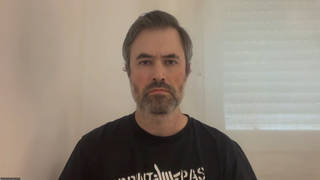
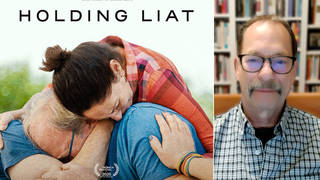
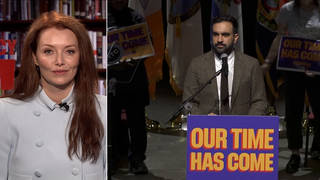
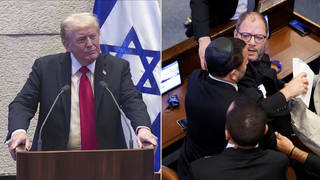





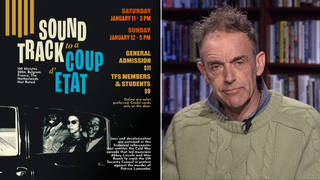
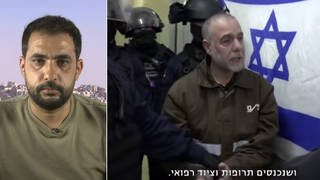
Media Options